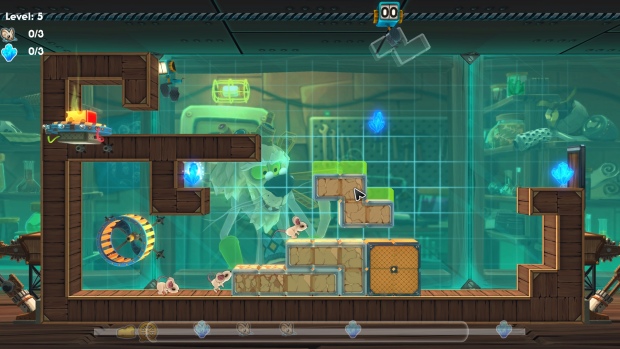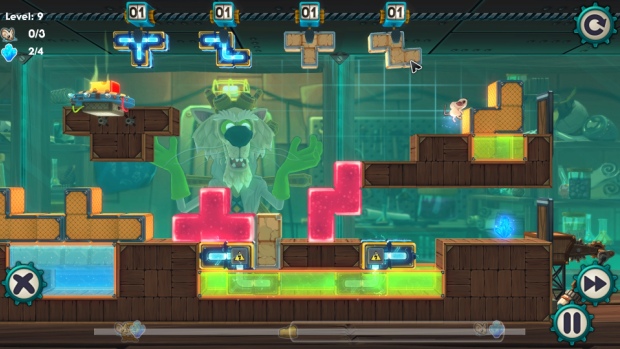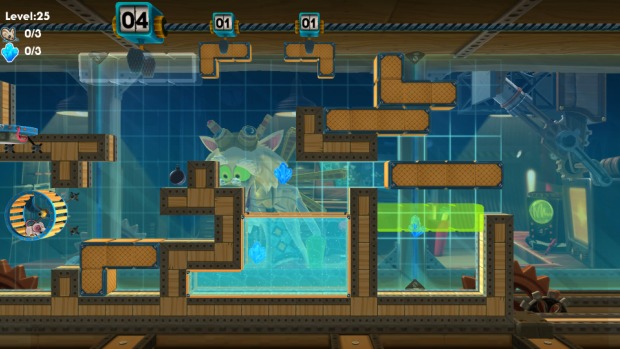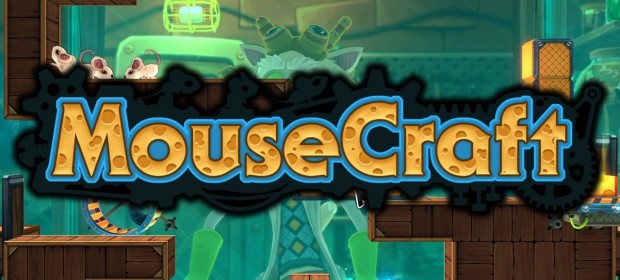Marketing executives have an awful lot to answer for. In fact, marketers of any kind have an awful lot to answer for. It’s quite easy to spin a line that hooks a certain type of person to a certain type of product, regardless of how accurate that line actually is.
Take the line, for example, that markets MouseCraft as a cross between Lemmings and Tetris. If you take the base concepts of both games as extremes and travel betwixt the two, then at some point upon the line between you will find MouseCraft, but it hardly uses the best parts of either.

In Crunching Koala’s game, you will be called, across 80 levels, to safely guide a trio of blind lab mice to a piece of cheese at the end of a small obstacle course. To aid you, you have a selection of blocks resembling Tetris pieces that you drop into the level to act as bridges, steps, barriers and safety nets for the mice, while collecting little bombs that remove blocks and a rare crystal substance that forms inside the test area.
Despite the cartoony visuals and the presence of a mad scientist cat named Schrödinger, there’s little context, or life, in what’s going on. It’s all very tame and straightforward. Quite why he has built such an elaborate machine is never entirely explained, nor is what it really does. There is a sinister undertone that never comes to fruition in any way, as the mice can only be killed by a handful of things, several of which are directly controlled by the player. It feels like a wasted opportunity not to be horribly cruel to the mice if you mess up, thus adding some kind of impact to your failures. As it is, being able to fail at all is almost totally moot.

You have as much time as you need to set a level up, and pressing Circle at any moment will undo your last move, or all your moves, meaning you can simply study a level and then use infinite retries until you get it right, at which point you’re graded on how many mice you saved and how many crystals you harvested – not the number of tries or how long it took. Obstacles are introduced as you progress, such as clockwork mice that will kill your rodent charges, and you’re given aids such as spongy blocks to cushion greater falls – but there aren’t a great many variables beyond these.
The four main zones aren’t particularly varied, and visual tedium sets in pretty quickly and then stays with you. It’s the same for the audio, sadly: if you play for more than a few levels a time it can all become quite irritating.
But it’s not all bad. The actual gameplay is somewhat idling, and despite the lack of a real fail-state. Some of the puzzles are very taxing, especially if you want to save all the mice and seize every single crystal in each level. Played in short chunks, it’s a nice time-waster for a commute, which makes it far better suited to the Vita than the home consoles or a PC.

If you do get bored, there is a level editor so you can build your own courses. It seems set up for PC and not all that slick to use with a pad instead of a mouse, but it’s pretty straightforward. As with many games of this type, you’ll probably end up getting more fun and challenge from community-made levels than those in the game.
VERDICT: MouseCraft is a likeable but simple puzzle game that barely touches the complexity of the two titles it claims to take inspiration from. Far too repetitive and too easy to work out, it’s better suited to a handheld than a larger console and isn’t likely to hold your interest for long unless you’re really hankering after a rodent-based puzzle game and can’t get hold of Lemmings. A little darkness and complexity would have gone a long way here, but as it stands MouseCraft just isn’t involving enough to heartily recommend.

DECENT. A 6/10 indicates that, while this game could be much better, it still has a fair amount to offer the player. It might be an interesting title sabotaged by its own ambition, or a game denied greater praise by some questionable design choices. Don’t avoid it outright, but approach it with caution.
Review code provided by publisher.






